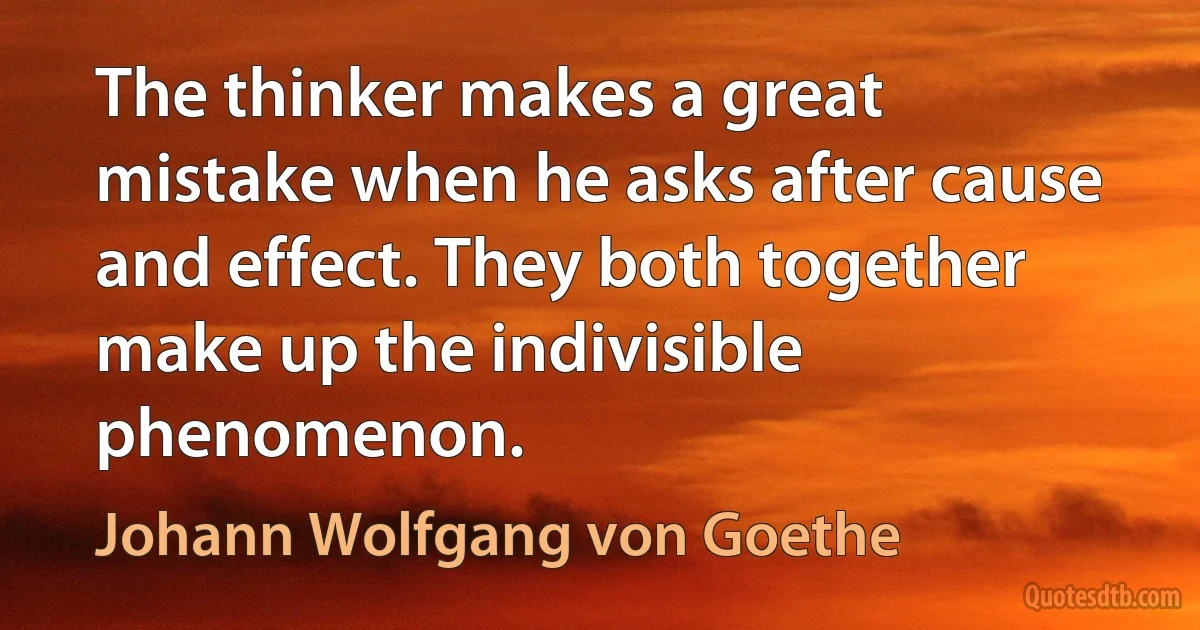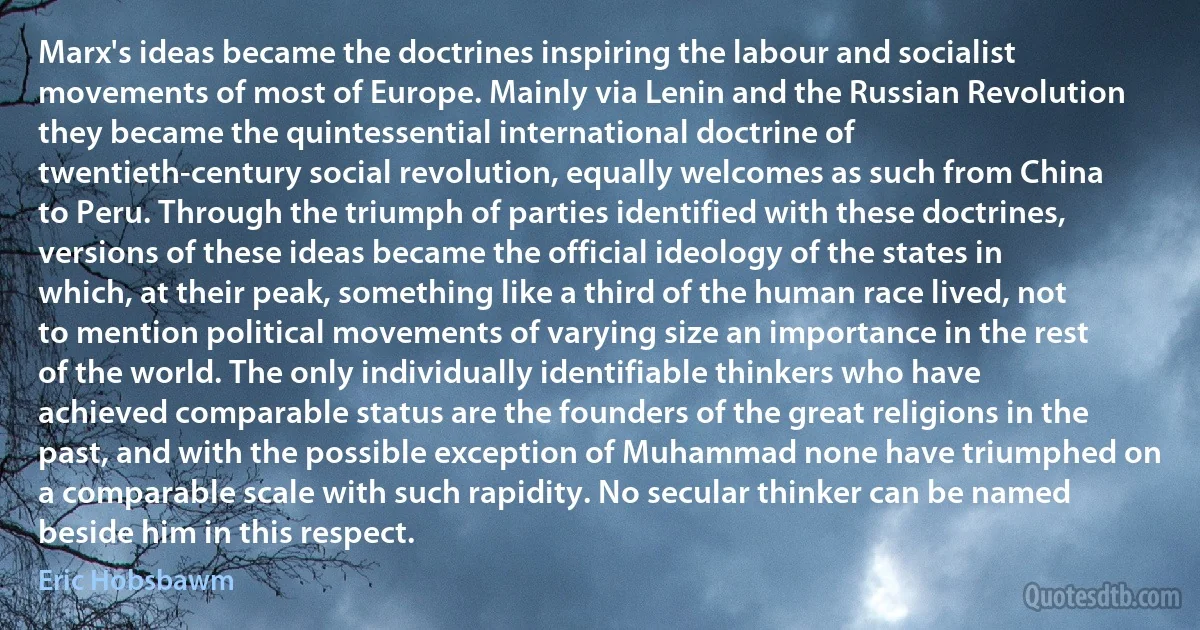Thinker Quotes - page 10
To understand oneself in existence is the Christian principle, except that this self has received much richer and much more profound qualifications that are even more difficult to understand together with existing. The believer is a subjective thinker, and the difference, is only between the simple person and the simple wise person. Here again the oneself is not humanity in general, subjectivity in general, and other such things, whereas everything becomes easy inasmuch as the difficulty is removed and the whole matter is shifted over into the shadow play of abstraction.

Søren Kierkegaard
A man with a scant vocabulary will almost certainly be a weak thinker. The richer and more copious one's vocabulary and the greater one's awareness of fine distinctions and subtle nuances of meaning, the more fertile and precise is likely to be one's thinking. Knowledge of things and knowledge of the words for them grow together. If you do not know the words, you can hardly know the thing.

Henry Hazlitt
A free thinker used to be a man who had been educated on ideas of religion, law, morality, and had arrived at free thought by virtue of his own struggle and toil; but now a new type of born freethinker has been appearing, who've never even heard that there have been laws of morality and religion, and that there are authorities, but who simply grow up with negative ideas about everything, that is savages.

Leo Tolstoy
Critical theory ... values Freud as a non-ideological thinker and theoretician of contradictions-contradictions which his successors sought to escape and mask. ... "The greatness of Freud,” wrote Adorno, "consists in that, like all great bourgeois thinkers, he left standing undissolved such contradictions and disdained the assertion of pretended harmony where the thing itself is contradictory. He revealed the antagonistic character of the social reality.” ... A parallel can be established between Marx's judgment on Ricardo and the post-Ricardians. To Marx, Ricardo was the classic and best representative of bourgeois economics since he articulated the contradictions of bourgeois society without glossing them over.

Russell Jacoby
At the time of his death, F.A. Hayek (1899–1992) was unquestionably the world's preeminent spokesman for classical liberalism and its most important thinker. He led an immensely productive life, over the course of which he made significant contributions to a variety of disciplines, among them economics, political and social theory, psychology, and the history of ideas.

Friedrich Hayek
Each bud flowers but once and each flower has but its minute of perfect beauty; so, in the garden of the soul each feeling has, as it were, its flowering instant, its one and only moment of expansive grace and radiant kingship. Each star passes but once in the night through the meridian over our heads and shines there but an instant; so, in the heaven of the mind each thought touches its zenith but once, and in that moment all its brilliancy and all its greatness culminate. Artist, poet, or thinker, if you want to fix and immortalize your ideas or your feelings, seize them at this precise and fleeting moment, for it is their highest point. Before it, you have but vague outlines or dim presentiments of them. After it you will have only weakened reminiscence or powerless regret; that moment is the moment of your ideal.

Henri-Frédéric Amiel
At Chicago, Hayek put aside his more technical economic work for the development of a social and political theory that became in time the most ambitious and complete synthesis to emerge from the ranks of the post-war Right. Among its themes - the overriding significance of the rule of law, the need for social inequality, the function of unreflective tradition, the value of a leisured class - were many cultivated by Strauss across the campus. Neither thinker, however, ever referred to the other. Did temperamental antagonism, or intellectual indifference, dictate the silence? Whatever the case, latent tensions of outlook between them were to find expression in due course. Schmitt, on the other hand, was never far from Hayek's mind – standing for the prime example of a skilled jurist whose sophistry helped to destroy the rule of law in Germany, yet a political theorist whose stark definitions of the nature of sovereignty and the logic of party, at any rate, had to be accepted.

Friedrich Hayek
More than an athlete, Cruyff was also a great thinker, someone who reinvented the sport (...) Cruyff has left us now, but his vision and philosophy will hopefully live forever. You can see it in the way Barcelona-one of two clubs Cruyff revolutionized, along with Ajax-still plays every week. It's a style that has admirers around the world. I think a lot of people share that [philosophy] with him. You want to see this type of game, where you set the tone, you control the game, you make it fast, you make it attractive and attacking. He's always been famous for his version of the 4–3–3 with the wide wingers, all technically highly gifted and fast. This is his mark."

Johan Cruyff
It is incomprehensible to me that any thinker can calmly call himself a modernist; he might as well call himself a Thursdayite. ... The real objection to modernism is simply that it is a form of snobbishness. It is an attempt to crush a rational opponent not by reason, but by some mystery of superiority, by hinting that one is specially up to date or particularly "in the know." To flaunt the fact that we have had all the last books from Germany is simply vulgar; like flaunting the fact that we have had all the last bonnets from Paris. To introduce into philosophical discussions a sneer at a creed's antiquity is like introducing a sneer at a lady's age. It is caddish because it is irrelevant. The pure modernist is merely a snob; he cannot bear to be a month behind the fashion.

G. K. Chesterton
One feels of him that there was much he did not understand, but not that there was anything that he was frightened of saying or thinking. I have never been able to feel much liking for Gandhi, but I do not feel sure that as a political thinker he was wrong in the main, nor do I believe that his life was a failure. ... One may feel, as I do, a sort of aesthetic distaste for Gandhi, one may reject the claims of sainthood made on his behalf (he never made any such claim himself, by the way), one may also reject sainthood as an ideal and therefore feel that Gandhi's basic aims were anti-human and reactionary: but regarded simply as a politician, and compared with the other leading political figures of our time, how clean a smell he has managed to leave behind!

George Orwell
He was quite a thinker ... I think if his life had been different, if he'd zigged instead of zagged, I could see him growing up to become a college professor - at a Christian college, probably, though the administration would no doubt have bitten their nails to the quick more than once over some of his ways. I have several letters from him where he expounded on the oddities of life. The joys and the quirks. He might have been a sociologist, even. People fascinated him. Life fascinated him, since he had squandered his chances of living a normal one. But he made the most of it, more so than anyone I've ever met.

Sean Sellers
Some of Spinoza's ideas are part and parcel of our culture, but to the best of my knowledge Spinoza is absent as a reference from the modern efforts to understand the biology of the mind. This absence is interesting in itself. Spinoza is a thinker far more famous than known. Sometimes Spinoza appears to rise out of nothing, in solitary and unexplained splendor, although the impression is false-in spite of his originality he is very much a part of his intellectual times. And he appears to dissolve as abruptly, without succession-another false impression given that the essence of some of his forbidden proposals can be found behind the Enlightenment and well beyond in the century that followed his death.

Baruch Spinoza
I shall not attempt to speculate as to what Spinoza might have been if he had lived in our time. For me, in any case, one thing is not open to doubt: Spinoza would never have been an agent of the League of Nations. The second point that I wish to emphasize is that we do not agree to yield Spinoza to our enemies in any case. There is no reason at all for this. Spinoza was a great materialistic thinker, and in this respect he should be considered a predecessor of dialectical materialism. The contemporary proletariat is Spinoza's only genuine heir.

Baruch Spinoza
Vygotsky studied the classical German philosophy on a professional level. In his student years began his acquaintance with the philosophy of Marxism, which he studied mainly using illegal editions. At this time was born Vygotsky's interest in the philosophy of Spinoza, who would remain his favorite thinker for the rest of his life.

Baruch Spinoza
I am utterly amazed, utterly enchanted! I have a precursor, and what a precursor! I hardly knew Spinoza: that I should have turned to him just now, was inspired by "instinct". Not only is his overtendency like mine - namely, to make all knowledge the most powerful affect - but in five main points of his doctrine I recognize myself; this most unusual and loneliest thinker is closest to me precisely in these matters: he denies the freedom of the will, teleology, the moral world-order, the unegoistic, and evil. Even though the divergencies are admittedly tremendous, they are due more to the difference in time, culture, and science. In summa: my lonesomeness, which, as on very high mountains, often made it hard for me to breathe and make my blood rush out, is now at least a twosomeness. Strange!

Baruch Spinoza



